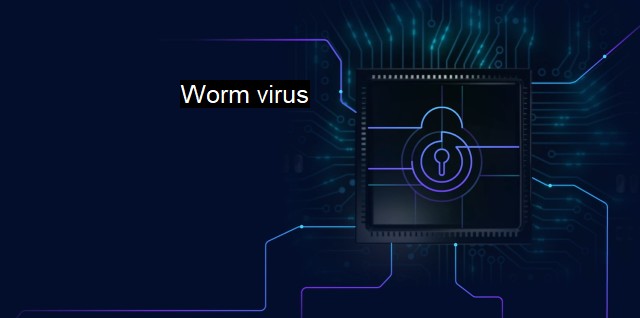What are Worm virus?
The Crucial Role of Antivirus Software in Protecting Against the Dangerous Worm Virus in Cybersecurity
A worm virus refers to a type of malicious software (malware) program whose primary function is to infect other computers while remaining active on infected systems. The term "virus" is synonymous with malicious software; a worm is a specific type of malware that is distinguishable from other forms in the way it replicates itself and spreads to other systems. A worm does not need to attach itself to an existing program to cause damage, whereas viruses require a host program to propagate.Malware like worms originate from the beginnings of the internet, a vast and complex domain of computers and networks. First appearing in the 1980s with the advent of the personal computer, worms were initially used to take advantage of weak parts in a system's security setup. In their simplest form, these worms were seen as exploratory pieces of coding that had the capability to duplicate copies of themselves, typically without a user's awareness, and spread over a network.
Their functionality began to shift dramatically as cybersecurity risks started to evolve. Unlike viruses, worms operate in a manner that exploits network interfaces. Worms typically find a specific vulnerability, create copies of themselves, and then send those replicas to other systems through network connections. This process allows the worm to use the infected machine as a host for spreading across networks without any active involvement from the user. Worms can transmit themselves through various methods such as file sharing, email, instant messages, or by taking advantage of software vulnerabilities.
Worms are much more dangerous than typical viruses since they can spread quickly and create havoc on a grand scale. For instance, a famous worm virus, known as Stuxnet, was used as a cyberweapon against Iran's nuclear facilities and caused serious damage to their operations. Such worm viruses are maliciously designed to have devastating effects, such as altering or deleting files, stealing sensitive data, installing a backdoor in the infected system, or recruiting the infected system into a botnet.
In addressing these security threats, antivirus programs play defense. These software applications identify potential threats, isolate them, and either remove or mend infected files. Anti-virus programs commonly safeguard against various malware forms, including viruses, Trojans, ransomware, and of course, worms.
To detect a worm, an antivirus program might rely on signature-based detection, which involves recognising malware based on known patterns of data or suspicious behavioral patterns. On the other hand, with newer strains, heuristic-based detection may be used, focusing on generic characteristics common to most worms. Also, with increased focus on cloud-based intelligence and machine learning, new strategies to detect unknown threats are continuously being developed and implemented in antivirus software.
User acknowledgment is essential; users should be aware of potential threats. They should make an effort to avoid downloading attachments or clicking on links in unsolicited or suspicious emails. Regular patching and updating of software to correct potential security weaknesses is also a good practice.
Worms are distinct types of malicious software that exhibit robust propagation abilities. Unlike viruses, they take advantage of vulnerabilities in network interfaces and can autonomously duplicate and spread without any user intervention. Typically, worms can result in damage to the system, compromise its performance, or worst-case scenario, steal sensitive data. Cybersecurity and antivirus measures are continuously evolving to counter the threat posed by such malicious software. This continuous interplay highlights the inherent need for vigilance, awareness, and updated protective software tools in our increasingly interconnected cyber world.

Worm virus FAQs
What is a worm virus?
A worm virus is a malicious software program that self-replicates and spreads through computer networks. It can cause serious damage by consuming system resources, deleting files, and even rendering a computer unusable.How does a worm virus infect a computer?
A worm virus can infect a computer in various ways, such as through email attachments, software downloads, or by exploiting vulnerabilities in the operating system. It can also spread across networks and infect other computers without any user intervention.What are the signs of a worm virus infection?
The signs of a worm virus infection may vary, but some common signs include slow system performance, unusual pop-ups, missing or changed files, and an increase in network traffic. If you suspect a worm virus infection, it is important to run a virus scan immediately.How can I protect my computer from worm viruses?
To protect your computer from worm viruses, you should always keep your operating system and antivirus software up-to-date. You should also avoid opening suspicious emails or downloading files from unknown sources. It is also recommended to use a firewall and keep regular backups of important files.| | A | | | B | | | C | | | D | | | E | | | F | | | G | | | H | | | I | | | J | | | K | | | L | | | M | |
| | N | | | O | | | P | | | Q | | | R | | | S | | | T | | | U | | | V | | | W | | | X | | | Y | | | Z | |
| | 1 | | | 2 | | | 3 | | | 4 | | | 7 | | | 8 | | |||||||